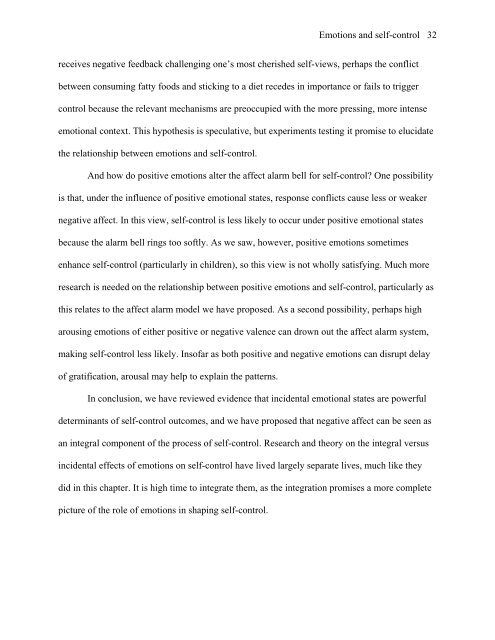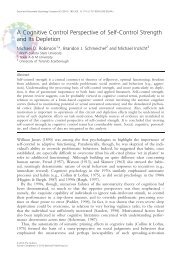Emotions and self-control 1 Incidental and Integral ... - Michael Inzlicht
Emotions and self-control 1 Incidental and Integral ... - Michael Inzlicht
Emotions and self-control 1 Incidental and Integral ... - Michael Inzlicht
Create successful ePaper yourself
Turn your PDF publications into a flip-book with our unique Google optimized e-Paper software.
<strong>Emotions</strong> <strong>and</strong> <strong>self</strong>-<strong>control</strong> 32<br />
receives negative feedback challenging one’s most cherished <strong>self</strong>-views, perhaps the conflict<br />
between consuming fatty foods <strong>and</strong> sticking to a diet recedes in importance or fails to trigger<br />
<strong>control</strong> because the relevant mechanisms are preoccupied with the more pressing, more intense<br />
emotional context. This hypothesis is speculative, but experiments testing it promise to elucidate<br />
the relationship between emotions <strong>and</strong> <strong>self</strong>-<strong>control</strong>.<br />
And how do positive emotions alter the affect alarm bell for <strong>self</strong>-<strong>control</strong>? One possibility<br />
is that, under the influence of positive emotional states, response conflicts cause less or weaker<br />
negative affect. In this view, <strong>self</strong>-<strong>control</strong> is less likely to occur under positive emotional states<br />
because the alarm bell rings too softly. As we saw, however, positive emotions sometimes<br />
enhance <strong>self</strong>-<strong>control</strong> (particularly in children), so this view is not wholly satisfying. Much more<br />
research is needed on the relationship between positive emotions <strong>and</strong> <strong>self</strong>-<strong>control</strong>, particularly as<br />
this relates to the affect alarm model we have proposed. As a second possibility, perhaps high<br />
arousing emotions of either positive or negative valence can drown out the affect alarm system,<br />
making <strong>self</strong>-<strong>control</strong> less likely. Insofar as both positive <strong>and</strong> negative emotions can disrupt delay<br />
of gratification, arousal may help to explain the patterns.<br />
In conclusion, we have reviewed evidence that incidental emotional states are powerful<br />
determinants of <strong>self</strong>-<strong>control</strong> outcomes, <strong>and</strong> we have proposed that negative affect can be seen as<br />
an integral component of the process of <strong>self</strong>-<strong>control</strong>. Research <strong>and</strong> theory on the integral versus<br />
incidental effects of emotions on <strong>self</strong>-<strong>control</strong> have lived largely separate lives, much like they<br />
did in this chapter. It is high time to integrate them, as the integration promises a more complete<br />
picture of the role of emotions in shaping <strong>self</strong>-<strong>control</strong>.



